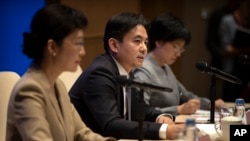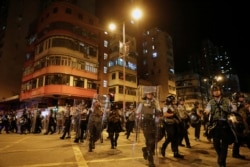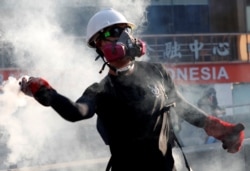As Hong Kong cleaned up after a general strike that splintered into a night of violent clashes between police and protesters, a Chinese government official warned opponents on Tuesday that "those who play with fire will perish by it."
Yang Guang, a spokesman for the Chinese government's Hong Kong and Macau Affairs Office, told reporters that Hong Kong protesters had abused their right to assemble and warned that China would not permit the semi-autonomous territory to challenge Chinese sovereignty.
He also criticized the protesters' frequent chants and graffiti tags quoting Edward Leung, an imprisoned former legislative candidate who once advocated for the city's independence from China, saying: "Liberate Hong Kong! Revolution of our time."
In that statement, Yang echoed the remarks of Carrie Lam, the city's chief executive, who said a day earlier that the protesters' "actions challenged national sovereignty," and threatened Hong Kong's separate rights, an arrangement with China known as "one country, two systems."
Protesters appear to be undeterred. Three young people wearing black masks and construction helmets appeared at a news conference Tuesday and asserted that the pursuit of democracy was "the inalienable right of the people."
Blocked streets and tunnels
Tuesday was filled with divergent interpretations of the protests and confrontations that roiled Hong Kong the day before.
The goal, protesters said, was to make sure Lam withdrew an extradition bill that would allow suspects to be shipped elsewhere for trial, including China, with its opaque legal system.
After many people in Hong Kong walked off their jobs on Monday, tens of thousands of people blocked streets, highways, trains and tunnels, vandalized police stations and lit fires, as riot squads unleashed tear gas and rubber bullets. Police said 148 people were arrested.
Police said they fired 800 canisters of tear gas, some at residents in their own neighborhoods.
In the months since Hong Kong residents began to protest the extradition bill, protesters have expanded their demands, calling for full voting rights, democratic elections, and an independent commission to examine policing in the city. The government has refused to bend to any demand.
Officials tried to color Monday's protesters as rioters trying to destabilize society, and violators of China's rule over the territory.
Yang denounced protesters' decisions to toss bricks and light fires. He repeated an earlier warning that China is supporting Lam and the police, and that Hong Kong should not spare anyone when it prosecutes violent crimes.
He added that the nation would "never allow a challenge to the principle of one country, two systems' to go unpunished and will never allow any turbulence that will threaten national unity."
Yang also stated that Hong Kong's police force was capable of handling the situation, though he did not rule out sending in the Chinese army.
At their earlier news conference, the young protesters dressed in black said recent events had not undermined the Hong Kong economy, nor created instability. However, one who spoke, using the pseudonym Jerry Chan, said if the People's Liberation Army was deployed, it would discourage foreign investment in Hong Kong and damage China's economy.
He said he was not scared by the prospect of Chinese troops, quoting the oft-used aphorism in this protest movement attributed to actor Bruce Lee.
"If the People's Liberation Army comes," he said, "I think we will be water' and go home to sleep."







